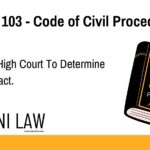This article is written by Nontokozo, a dedicated law student with a keen interest in Indian and international law. She aspires to specialize in these areas and is passionate about using her knowledge to help others navigate legal complexities. For any personal queries or suggestions, feel free to reach out to us through our official channel or through contact no. +91 – 8569843472
Introduction
Contracts form the backbone of both business and personal relationships—offering clarity, trust, and legal enforceability. Whether you’re entering into a multi-crore commercial deal or hiring a freelance designer, the success of any arrangement often hinges on how well the contract is drafted. It’s not just about copying templates or filling in blanks. True contract drafting requires legal foresight, commercial understanding, and precision in language.
This editorial dives into the essentials of effective contract drafting—highlighting legal principles, key clauses, types of agreements, and common drafting mistakes. Whether you’re a lawyer, law student, entrepreneur, or freelancer, understanding these fundamentals is crucial for preventing disputes and protecting your interests.
What is Contract Drafting?
Contract drafting is the process of putting a legal agreement into written form. It outlines the rights, duties, and obligations of the parties involved and ensures that the contract is enforceable under the law. A well-drafted contract acts as a safeguard—governing everything from business deals to employment, services, and beyond.
Key Legal Provisions in Contract Drafting
No matter how complex or simple a contract is, these core principles must be followed:
- Capacity & Consent – All parties must be competent and must enter the agreement voluntarily.
- Lawful Purpose – The agreement should not violate laws or public policy.
- Consideration – There must be a mutual exchange of value.
- Clarity of Terms – Define obligations, timelines, and remedies clearly.
- Statutory Compliance – Certain contracts (e.g., real estate) must follow specific legal formalities.
- Governing Law & Jurisdiction – Clarify which legal system and court will handle disputes.
Important Clauses Every Contract Should Include
A well-rounded contract typically contains the following clauses:
- Parties Clause – Identifies the individuals/entities involved.
- Recitals (Background) – Provides the context of the agreement.
- Definitions – Ensures consistent understanding of terms used.
- Term & Termination – Specifies duration and exit conditions.
- Obligations of the Parties – Core deliverables and responsibilities.
- Payment Terms – Mode, timeline, and conditions of payment.
- Confidentiality – Restricts sharing of sensitive information.
- Indemnity – Allocates liability for potential losses or claims.
- Limitation of Liability – Caps the damages a party can claim.
- Dispute Resolution – Outlines litigation, mediation, or arbitration processes.
- Governing Law & Jurisdiction – Indicates applicable laws and courts.
- Entire Agreement – States this is the final and binding agreement.
- Amendment Clause – Describes how changes can be made.
- Assignment Clause – Specifies transferability of rights/obligations.
- Notices Clause – Details how communication must be sent and received.
Types of Contracts and Their Unique Clauses
1. Employment Contract
- Key Clauses: Job description, non-compete, probation period, termination.
2. Sale of Goods Contract
- Key Clauses: Delivery terms (e.g., CIF/FOB), inspection rights, title transfer, warranties.
3. Service Agreement
- Key Clauses: Service levels, deliverables, change request procedure, payment terms.
4. Lease Agreement
- Key Clauses: Rent escalation, maintenance duties, renewal rights, permitted use.
5. Franchise Agreement
- Key Clauses: Franchise fees, brand usage, territory exclusivity, training and support.
6. Joint Venture Agreement
- Key Clauses: Capital contribution, management, profit sharing, exit strategy.
7. Non-Disclosure Agreement (NDA)
- Key Clauses: Definition of confidential info, exclusions, duration, breach consequences.
8. Construction Contract
- Key Clauses: Scope of work, change orders, penalties for delay, retention clauses.
9. Licensing Agreement
- Key Clauses: IP rights granted, royalty structure, quality control, audit rights.
10. Shareholders’ Agreement
- Key Clauses: Pre-emption rights, voting power, exit clauses, deadlock resolution.
Common Mistakes to Avoid in Contract Drafting
- Vague Language
- “Reasonable time” or “best efforts” without context
- Define everything clearly and objectively.
- Inconsistent Terminology
- Switching between “Buyer” and “Client” for the same party
- Use one defined term consistently.
- Missing Essential Terms
- No mention of payment, deadlines, or obligations
- Ensure every key term is included.
- No Termination Clause
- Omitting exit mechanisms
- Provide clear “termination for cause” and “termination for convenience” options.
Conclusion
Contract drafting is both an art and a science. It requires a deep understanding of law, business context, and language. A well-drafted agreement not only protects your client’s interests but also reduces the chances of litigation or misunderstanding.
Whether you’re a legal professional or a business owner, investing time in learning the nuances of contract drafting will pay dividends in the long run. At ApniLaw, we believe that legal literacy empowers better decisions—and it all starts with getting the contract right.








